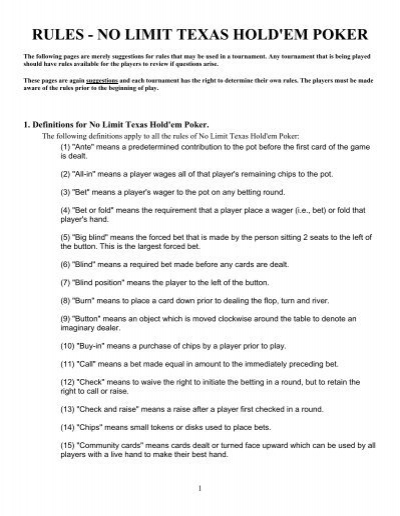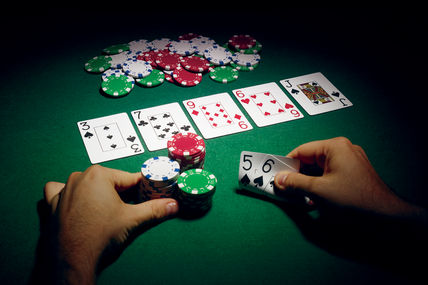How To Bet Texas Holdem Poker
Rule #6: Bet Limits: Different variations of Texas Holdem poker rules exist for betting limits: Limit Hold’em, Pot Limit Hold’em, and No-Limit Hold’em. Limit Holdem restricts the bets on the pre-flop and flop rounds of betting to the size of the big blind (“the small bet”), while it is limited to two times the big blind (“the big bet”) during the turn and the river. Each hand of Texas Hold’em Poker starts with two blinds – the big blind and the small blind. Prior to cards being dealt, the player to the left of the dealer puts in chips equal (usually) to half the size of the minimum bet for the game.
How to Play Texas Hold'em Poker: learn the most popular of all poker variations step-by-step. All of the marquee tournaments around the world highlight this.
Poker is arguably the most popular card game in the world – played by millions of people, both online and in the real world. However, for many, playing poker isn’t nearly as rewarding as it could be for one very simple reason – they either don’t really understand how betting in poker works, or lack the understanding of when to bet, how to bet and how much to bet.
In this quick tutorial, we’ll take you through all of the most fundamental aspects of betting in poker. Find out why betting is important in the first place, when you should bet and when you should call, understanding your opposition, betting strategies and much more.
Why We Bet in Poker And How To Bet
Betting in poker is probably the most misunderstood aspect of the game, and many assume that betting is just part of what you do, without actually understanding that there are fundamental reasons why we bet in poker.
Here’s an interesting bit of information that you may not know about which perfectly illustrates the point of this tutorial. A few years ago, PokerStars, one of the biggest online poker sites in the world, got an auditing firm to analyze over a hundred million hands played on their site over a period of time. The results were very interesting to say the least. Out of all those hands, only about 25% actually went all the way to the end or ‘showdown’.
What this means is that around 75% of the hands surveyed were concluded long before showdown. In other words, one player at the table got all the other players to fold, regardless of the quality of his own hand. How did they get that right? Through smart betting.
When it comes to betting in poker, there are essentially two main reasons why we do so. One is that we have a great hand and, through smart betting, will try to push the value of the pot as high as possible before the conclusion of the round. The second reason is that you don’t have the best hand but work to get everyone else at the table to think that you do have a winning hand. If they fold, you win anyway.
To Call or Raise? Betting Strategies.
In poker, throwing chips into the pot is betting, which includes raising, calling a bet or opening the betting. However, calling and raising will affect your poker strategy in very different ways, and send very different signals to others at the table. If you’re looking to put pressure on your opponents (regardless of the quality of your own hand), calling certainly won’t do that for you. When you put pressure on others at the table, you make them have to choose, either fold or take you on. If you recall at the beginning, we mentioned that 75% of hands are won before the game gets down to the showdown. This is done through aggressive betting when you make the initial bet or raising the current bet, not calling.
The Poker Table; Knowing Your Opposition
Knowing how everyone at the table plays, their skill and experience levels and the way they bet is a vital part of your betting strategy. For example, bluffing works best against good, experienced players, while ‘value betting’ (betting to increase the pot value) works best against weaker or inexperienced players. The reason for the latter is simple. Because of their inexperience, these types of players will not fold easily and, if you have a good hand, you can keep the pressure on them to keep betting. Inexperienced players will usually keep calling right down to the river, giving you the chance to really push the pot value up for a big win.
On the other hand, bluffing works great against more experienced and tighter players because the chances of them folding a good hand against aggressive betting are higher. When playing against other aggressive players, there is always a very good chance that the aggressive opponent will re-raise against your bet. In this case, if you’re unsure of your hand in the fight, it might be best to fold before throwing any more chips into the pot and rather checking.
Who Are You At The Poker Table?

Every poker player has a style of betting which is a signal to other players at the table how to best bet against them. This includes you! In poker, players are either loose or tight, which is based on how they behave at the table. For example, if you are the type of player that sees virtually every flop and will, more often than not, make a bet after the flop to continue the betting, you are a loose player. This means that the chances of you getting hit with a lot of calls on your bets or re-raises on your bets are pretty high.

On the other hand, if you’re the sort of player that folds quite often to bets made by others at the table, or folds to re-raised bets, the chances of smart players betting into will be pretty high. In terms of strategy, being a tight player can work really well for you, especially if you happen to have a really strong hand. However, it can also blow up in your face to a certain extent too. The reason for this is that other players will be more mindful of your bets and could fold against your bets more often too, which could end up making it harder for you to build high value pots. For instance where I play on a regular basis there is a gentleman who only ever plays the top five hands, so if he gets into a hand, even just calling, I get out unless I have a great starting hand too.
Betting In Poker; Summing It Up.
How you choose to bet at the table is ultimately how you will be seen by other players at the table. Remember, every player at that table is watching you like a hawk, or at least that is what you should be assuming at all times. Every action, every bet you make in poker is seen as either a strength or a weakness to be exploited. Making bold and strong bets sends the signal that your hand is very good. When your turn comes, know what you need to do and do it. Be bold and decisive because if you hesitate, make clumsy moves or seem indecisive, this can be seen as weak, and could unravel your game.
More from my site

Wanna learn how to play free poker texas holdem, but don't want to embaress yourself in front of your friends on poker night?
Try our 'normal difficulty' Texas Holdem free poker game. It's single player, so you don't have to worry about looking the fool in front of your friends and family--and it's difficulty is just right for novice poker players!
Master the odds of real Texas Holdem by playing this free poker Texas Holdem game. Watch your skills improve as your high score shoots up with each free poker game. Each AI opponent has his own unique personality--just like real people--so you can figure out all the little quirks involved in playing real texas holdem poker
- Single player free poker game - Texas Holdem
- Master the odds of real Texas Holdem poker
- Compete against your own high score and watch your game improve
- Learn all five unique AI personalities - each with his / her own playing behavior
- Poker game is automatically saved as you play
Real Money Texas Holdem Sites
DISCLAIMER: The games on this website are using PLAY (fake) money. No payouts will be awarded, there are no 'winnings', as all games represented by 247 Games LLC are free to play. Play strictly for fun. This is NOT a casino game.